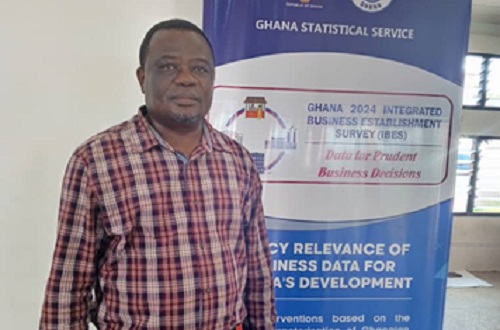Samuel Adotevi
The Ghana 2024 Integrated Business Establishment Survey (IBES) has officially been launched in Takoradi, in the Western Region.
The survey is being implemented by the Ghana Statistical Service (GSS) in partnership with the Ministry of Trade and Industry, the Association of Ghana Industries (AGI), the World Bank, and other key stakeholders in the public and private sectors.
The 2024 IBES which is the fifth edition will be conducted in two phases. The first phase which is a census will commence on January 15, 2024 and will provide a comprehensive listing of all business units in the country and information on their characteristics.
The phase two will involve a sample survey of selected businesses to obtain detailed data on their activities.
During the phase one of the IBES, all business units in Ghana would be enumerated, irrespective of whether they are for-profit or not-for-profit; large or small; in cities, towns or villages; at physical locations or online; at markets, shops, offices or within residential facilities or any other location.
In the Western Region, about 1,200 enumerators would be deployed by the Regional Statistical Service to collect economic data on businesses across the 16 districts in the region.
Western Regional Statistician Samuel Adotevi, who disclosed this said the initiative would help in taking informed economic decisions by all stakeholders.
He added that key activities preceding the data collection will include consultative stakeholder engagements, recruitment and training of trainers, field officers, and other officials.
“The primary goal of IBES phase one is to produce an updated Statistical Business Register and generate important data for national development,” he revealed.
He said the IBES 1 will provide updated statistics on activities, locations, ownership, ages, and sizes of businesses to inform policy, planning, and monitoring of business growth and national development programmes.
“It will also provide updated statistics on the current structure of Ghana’s economy to facilitate the revision of key macroeconomic indicators, including Gross Domestic Product (GDP), Producer Price Index (PPI), and the Index of Industrial Production (IIP),” indicated.
“Others include the characteristics of the informal sector to guide the development of policies aimed at formalising the economy and improving the welfare of workers in the various sectors,” he added.
Mr. Adotevi appealed to the business community to cooperate with IBES officials to ensure active participation and successful implementation of the important national exercise.
From Emmanuel Opoku, Sekondi


